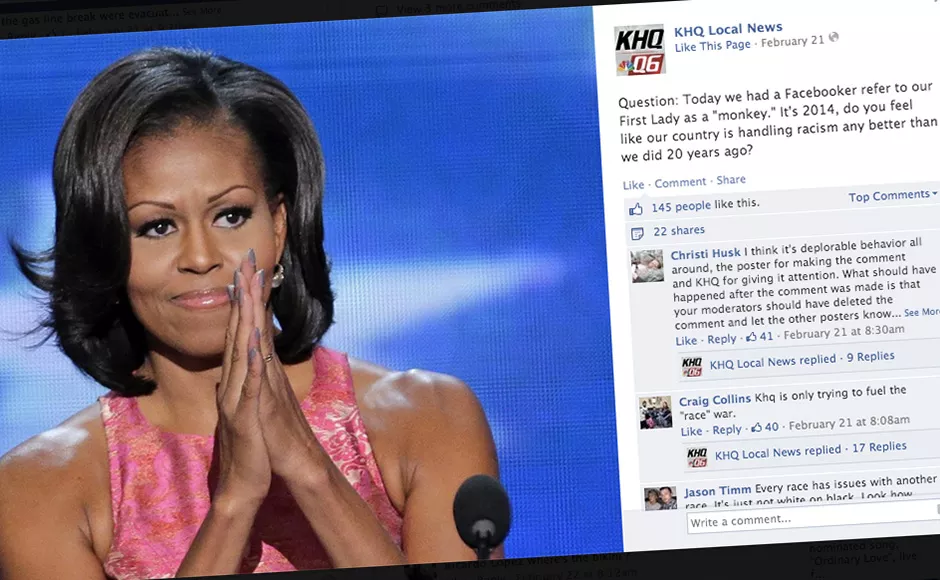Racism and all of its ignorant offshoots have periodically popped up in the Inland Northwest. Aryan Nations? Yeah, we dealt with that. A white supremacist trying to detonate a bomb at the Martin Luther King Jr. Day march? See Spokane, 2011.
Whenever such stories appear here or elsewhere, news outlets grapple with tough decisions. How much attention to give the issue? If people are just looking for attention or perverted glory, how do we report the story without giving perpetrators the attention they seek? In some cases, is it best to ignore the "news"?
That question is made more complex in this age of instant Internet sharing and social media "engagement."
KHQ-TV seemed to face that last week by posing a question on Facebook that, by local news standards, went "viral." It started with the station posting a picture of First Lady Michelle Obama, with this note: "Question: Today we had a Facebooker refer to our First Lady as a 'monkey.' It's 2014, do you feel like our country is handling racism any better than we did 20 years ago?"
As of Monday, the post had received nearly 700 comments — remarks that covered the spectrum from decrying the person who made the "monkey" comment to decrying KHQ for even posing the question. And of course there were plenty who joined in the racism.
For its part, KHQ defended its post in the Facebook comment thread after someone accused the station of "trying to fuel the 'race' war": "Really? You think we are fueling the race card? Do you have any idea how many racist comments we see on our Facebook threads every day? There are too many to count. Typically we just ignore them but we wanted to try and bring awareness to the issue by starting a positive discussion."
Jeff Hite, KHQ's assistant news director, adds: "We felt that the topic was a good conversation starter on Facebook, as opposed to our website (or on air). We do like to engage the audience in a thoughtful way."
It's sometimes difficult to see how a "thoughtful" conversation could come from Facebook comments, or any website comment section. News outlets have been trying to start community dialogue since the dawn of the Internet, but now some, like Popular Science, have shut down web comments entirely, ceding that negativity without substance undermined their editorial mission. Locally, the Spokesman-Review took a " holiday break" from web comments in December.
It's perfectly laudable (and necessary) for news outlets to encourage discussion around topics of societal importance. As the recent Florida murder trials of George Zimmerman and Michael Dunn show, race is still a topic of national conversation. But as KHQ's attempt to generate debate shows, it's easier said than done.
Before asking such questions on their Facebook pages, or in their printed pages, news outlets should consider what kind of discussion they're trying to have, and what kind of "engagement" they seek. If 700 (or more) argumentative comments is how we measure successfully discussing a topic as deeply divisive as race, then KHQ seemingly succeeded.
But there's something to be said about stripping away the veil and distance the Internet allows us all. If KHQ (and other news outlets and community organizations) had instead convened a community forum to discuss the issue, we'd expect a different, more constructive tone to the comments. That is, if anyone would have bothered to show up — because true engagement is hard. It takes time and energy, and journalists themselves have to get out from behind their computers. ♦
Scott A. Leadingham is director of education for the Society of Professional Journalists and editor of its magazine, Quill.




















